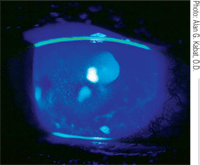Q: Conventional wisdom says that we should advise our dry eye patients to drink more water, but several of my elderly patients who have nocturia are
reluctant to do so. What should I do in cases like this?

A: Nocturia, which refers to excessive and disruptive urination at night (one or more times), typically affects older people more often than younger adults, and those who are age 65 and older are more likely to experience a need to urinate at night.1,2 These same patients also have a significantly increased incidence of dry eyes and dry mouth.3
Keep in mind that those who are age 65 and older experience decreased thirst sensation and reduced fluid intake at times. So, older patients may be at risk for not taking in enough water because thirst stimuli changes with age.
You may have to reconsider how much fluid you recommend that the patient drinks, says Paul M. Karpecki, O.D., of Lexington, Ky.
More specifically, you want these patients to restrict their fluid intake, particularly alcohol and caffeinated beverages, within two hours of bedtime but to maintain adequate hydration through fluid consumption during the day, says Alan G. Kabat, O.D., of Nova Southeastern University College of Optometry in Fort Lauderdale, Fla.
However, if the patient reports frequent urination during the day, it could be an indicator of an underlying health problem. Examples include prostate enlargement, diabetes or bladder cancer in men, and urinary incontinence, pregnancy or urinary tract infection in women.
Also consider whether the patient is using any systemic medications, such as a diuretic, which could be promoting both dry eye and urinary frequency. “This information should be discovered in a careful history,” Dr. Kabat says. “Often a consultation with a PCP can result in a change of medication that improves symptoms.”
Q: Should we even recommend that our dry eye patients increase their water intake given the lack of scientific evidence? And, if so, how much should we advise them to drink?
A: Increased water intake has no value in dry eye management, says optometrist Mark Vogel, of East Patchogue, N.Y. There are no studies that prove a relationship exists between increased water consumption and reduced dry eye.
“Tear production is an active process, and the fact that you’re putting more water in doesn’t do anything,” Dr. Vogel says. “In fact, it dilutes all the good contents of the tears.”
He prefers to prescribe treatment with artificial tears and, if necessary, a topical steroid such as Lotemax (loteprednol, Bausch + Lomb) for two weeks to one month. If this treatment isn’t successful, then he puts the patient on Restasis (cyclosporine, Allergan).

No studies prove a relationship between increased water consumption and reduced dry eye.
Some other optometrists, however, disagree. “There are no studies tied to water intake and dry eye, but that doesn’t mean that it isn’t a sound recommendation,” Dr. Karpecki says. By consuming more water, patients reduce their risk of dehydration and kidney stones and improve organ function.
A general recommendation for fluid intake is eight or nine cups daily.4 Another basic recommendation is to take half the patient’s weight and use that number for water consumption. For example, if the patient weighs 160 pounds, he needs to drink 80 ounces of water (four bottled waters) a day.
1. Marinkovic SP, Gillen LM, Stanton SL. Managing nocturia. BMJ. 2004 May;328(7447):1063-6.
2. National Association for Continence. Nocturia. Available at:
www.nafc.org/bladder-bowel-health/nocturia. Accessed May 24, 2011.
3. Asplund R. Nocturia in the elderly in relation to thirst, dry mouth and dry eyes. Can J Urol. 2004 Aug;11(4):2322-6.
4. Mayo Clinic. Water: How much should you drink every day? Nutrition and Healthy Eating. Available at:
www.mayoclinic.com/health/water/NU00283. Accessed May 25, 2011.

